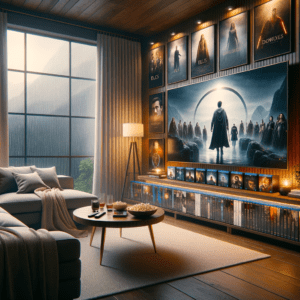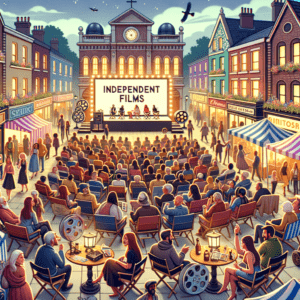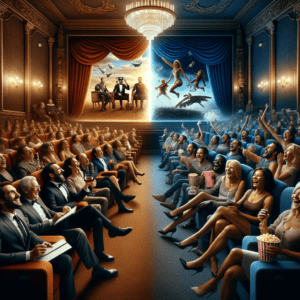Picture This: My Movie Theater Moment
Close your eyes and picture this with me: I’m lounging in a dimly lit cinema, popcorn in hand, settling in for what promises to be a cinematic journey. The screen lights up, and I’m instantly swept into a world unlike any other, brimming with colors, emotions, and landscapes that defy imagination. I thought I had come for another Hollywood flick that everybody’s been yammering about, but there’s something quite different dancing on the screen. It’s that cinematic magic from Asia, weaving itself brilliantly into the fabric of the story.
Now, don’t get me wrong—I’m not some fancy film critic or academic with mountains of credibility on the topic. I’d call myself an enthusiastic movie buff, really, who’s always up for a good story. So, let’s wander through this blend of Hollywood sheen and the rich texture of Asian cinema with me.
The Allure of the East
The first time I stumbled upon an Asian film, it felt like finding a hidden stash of candy. I was wandering in an entirely new culture, drawn in by its traditions, storytelling style, and something else I couldn’t put my finger on right away. Let’s rewind to a lazy winter weekend when a friend suggested I dive into a Korean drama—and oh boy, it was like being hit by a storytelling tornado!
The films weren’t just running on a straight track; they twisted and turned and had me constantly guessing. The emotional depth was nuts, but in a good way.
Asian directors from the likes of Japan, South Korea, China, and India have a way of grabbing your attention, like that friend who reels you into a never-ending conversation. They’ve got guts, you know? They’re like, “Rules? Where we’re going, we don’t need rules,” and sometimes leave me sitting there thinking, “Whoa, what was that?!”
Hollywood’s been picking up on this for a while now, tipping its hat to legends like Akira Kurosawa. Without his genius “Seven Samurai,” would we even have “The Magnificent Seven”? I seriously doubt it.
Storytelling: A Universally Palatable Flavor
Asian movies explore themes that, no matter where you’re from, hit home. When I watched “Parasite,” it was like being strapped into a rollercoaster with emotions ranging from jaw-dropping surprise to admiration. The movie tackles class struggles that are common worldwide but does so with a fresh twist that leaves you glued to your seat.
I think what’s truly captivating is how Asian storytellers make you feel so in sync with their characters and world. Real emotions are laid bare—love, loss, revenge—getting you all introspective and contemplating diverse themes.
Hollywood caught onto this magic too. Mind-blowing films like “The Matrix” owe a nod to Hong Kong’s martial arts influence, and Japanese horror has gifted us franchises that taught Hollywood-goers to check under their beds. It’s about weaving those authentic elements into their own narration, crafting stories that reach a universal audience.
The Action Genre: A Kaleidoscope of Punches and Kicks
Let’s dive into action movies. I mean, who doesn’t remember the iconic slow-mo bullet dodges of “The Matrix”? Hollywood action has a whole lotta twists to thank Asian cinema for. Bruce Lee came on to the scene like wildfire, introducing viewers to the brilliance that is Chinese martial arts. Then there’s Jackie Chan with his insane stunts and Bollywood films taking larger-than-life action to dizzying heights.
Asian action sequences almost become art through their meticulous choreography, leaving you with a dropped jaw and widened eyes. Hollywood wisely partners with Asian talent to bring authenticity to the scenes while tossing in some blockbuster budgets.
Cinematic Vision: Beyond the Art of Filmmaking
Visuals, to me, are one of the biggest Asian contributions to Hollywood. The aesthetic magic Asian cinema holds is like painting with light. From the tiniest details to sweeping landscapes, every frame could hang on a wall.
Think of Studio Ghibli’s Hayao Miyazaki and his films like “Spirited Away.” These stories seamlessly blend fantasy with reality – they arrest you visually yet whisper truths to your soul. Even Pixar took a page from this playbook and began making visually and thematically rich animations.
What truly fascinates me? The peaceful moments where silence speaks volumes. Scenes breathe. Characters reflect. It’s a lovely change from the fixation on breakneck pacing in many Western films. It’s as though Hollywood’s learning the poetry of stillness.
Cultural Exchange: The Rise of Asian Talent in Hollywood
What’s even more heartening is seeing Asian talents shine bright on Hollywood’s grand stage. From Awkwafina’s humor to Gemma Chan’s poise, it’s honestly heartwarming. Directors like Bong Joon-ho aren’t just reshaping genres—they’re creating legacy moments that herald an evolving industry.
And no, this isn’t just a passing phase. It’s a celebration of talent across cultural boundaries. Mainstream audiences now embrace stories from diverse backgrounds, and that’s truly beautiful!
A Personal Reflection
Over the years, as I’ve gobbled up film after film, there’s an undeniable allure to how Asian cinema sweeps into our imagination. Even Hollywood finds ways to tip its hat—sometimes subtly, sometimes with a light-up sign.
Of course, not every influence results in cinematic gold (hey, everyone trips sometimes!). But Hollywood’s open-minded journey, learning and evolving, adds layers to stories and characters, enriching storytelling as a whole.
Honestly, for me, watching Hollywood and Asian cinema swap creative tales feels like watching old friends yarn tales by the fireside. This teamwork is cinema’s way of growing, exploring, and concocting enchanting stories for global audiences.
Where will this ongoing cross-cultural friendship take us next? I’m psyched to find out because one thing’s for sure—it’s a thrilling era to be a movie fan.
And so, with that, I eagerly await the next flickers on the big screen. The Asian influence is alive, delightful, and weaving its storytelling wonders into Hollywood moments. Can you feel it too? Darn right, you can!














